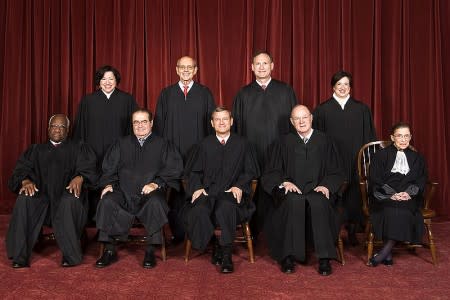Supreme Court rules in Obamacare challenge case
A divided Supreme Court on Monday said the two for-profit companies that requested religious exemptions from the Affordable Care Act, or Obamacare, can have them under limited circumstances.
In a majority opinion written by Associate Justice Samuel Alito, the Justices said the exceptions only apply to the Affordable Care Act’s contraception mandate and in relation to closely held companies that had objections under the federal Religious Freedom Restoration Act (RFRA).
The Court didn’t rule on First Amendment arguments in the cases.
The cases were not only closely watched for how they could affect Obamacare, but also for how they could give profit-making corporations a constitutional right to an exemption from laws that must be obeyed by everyone in the general public.
In the 5-4 decision, Alito said the closely held corporations cannot be required to provide contraception coverage under Obamacare if they had religious objections.
The IRS defines a closely held corporation as one that has more than 50 percent of the value of its outstanding stock owned (directly or indirectly) by five or fewer individuals and is not a personal service corporation.
“Protecting the free-exercise rights of closely held corporations thus protects the religious liberty of the humans who own and control them,” said Alito.
The decision is also narrowly focused on just the contraception mandate, and it doesn’t invalidate other parts of Obamacare.
Alito also stated that the federal government failed to prove that the contraception mandate was the least restrictive means of advancing its interest in guaranteeing cost-free access to birth control. But the decision also allowed the government to provide the same products to employees, instead of their employer.
“There are other ways in which Congress or HHS could equally ensure that every woman has cost-free access to the particular contraceptives at issue here and, indeed, to all FDA-approved contraceptives,” Alito said.
The two cases also touched on other pending cases in the legal pipeline about the Affordable Care Act. When the cases were heard at the Court in March, at least 73 other legal challenges were being mounted to parts of the ACA that allegedly violated religious beliefs.
In Hobby Lobby Stores v. Burwell, Hobby Lobby, a craft store chain, and its sister company, Mardel Christian bookstore, wanted an exemption from an Obamacare requirement that it provide insurance coverage for morning-after pills and similar emergency birth control methods and devices.
In Conestoga Wood Specialties Corp. v. Health and Human Services Department. a Mennonite family-owned, profit-making business claimed that the ACA’s birth control mandate violated the company’s rights under the First Amendment and the federal Religious Freedom Restoration Act (RFRA).
It had been expected that divided Court would rule mostly on RFRA-related aspects of the decision.
RFRA is a federal statute that seeks to control laws that substantially burden a person’s free exercise of religion.
The federal version of the Religious Freedom Restoration Act dates back to 1993, when it was passed by Congress after a controversial Supreme Court decision in 1990 angered liberals and conservatives. But after Congress passed RFRA, the Supreme Court ruled in 1997 that the Act couldn’t be applied to states.
Currently, at least 22 states have their own versions of RFRA laws, as a response to the 1997 Supreme Court decision.
Recent Stories on Constitution Daily
What is RFRA and why do we care?
Podcast: Is teacher tenure unconstitutional?
Justice Department memo explains justification for drone strikes abroad



